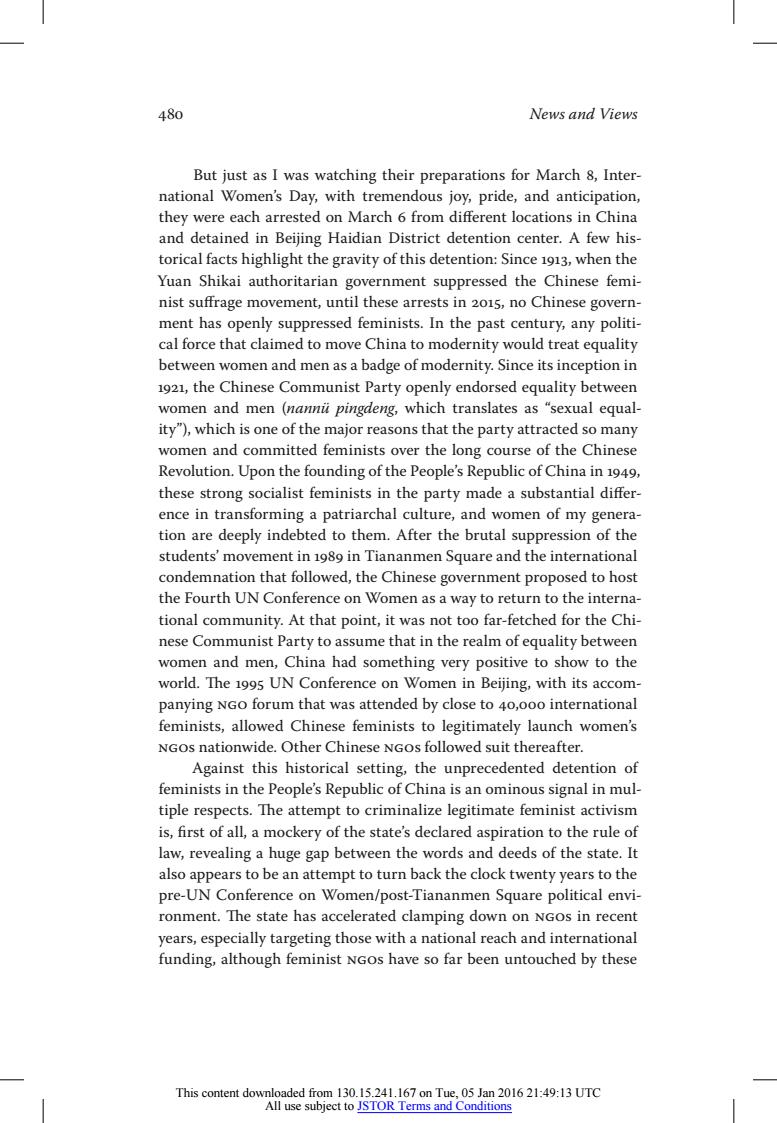正在加载图片...

480 News and Views But just as I was watching their preparations for March 8,Inter- national Women's Day,with tremendous joy,pride,and anticipation, they were each arrested on March 6 from different locations in China and detained in Beijing Haidian District detention center.A few his- torical facts highlight the gravity of this detention:Since 1913,when the Yuan Shikai authoritarian government suppressed the Chinese femi- nist suffrage movement,until these arrests in 2015,no Chinese govern- ment has openly suppressed feminists.In the past century,any politi- cal force that claimed to move China to modernity would treat equality between women and men as a badge of modernity.Since its inception in 1921,the Chinese Communist Party openly endorsed equality between women and men (nannii pingdeng,which translates as "sexual equal- ity"),which is one of the major reasons that the party attracted so many women and committed feminists over the long course of the Chinese Revolution.Upon the founding of the People's Republic of China in 1949, these strong socialist feminists in the party made a substantial differ- ence in transforming a patriarchal culture,and women of my genera- tion are deeply indebted to them.After the brutal suppression of the students'movement in 1989 in Tiananmen Square and the international condemnation that followed,the Chinese government proposed to host the Fourth UN Conference on Women as a way to return to the interna- tional community.At that point,it was not too far-fetched for the Chi- nese Communist Party to assume that in the realm of equality between women and men,China had something very positive to show to the world.The 1995 UN Conference on Women in Beijing,with its accom- panying NGo forum that was attended by close to 40,o00 international feminists,allowed Chinese feminists to legitimately launch women's NGos nationwide.Other Chinese NGos followed suit thereafter. Against this historical setting,the unprecedented detention of feminists in the People's Republic of China is an ominous signal in mul- tiple respects.The attempt to criminalize legitimate feminist activism is,first of all,a mockery of the state's declared aspiration to the rule of law,revealing a huge gap between the words and deeds of the state.It also appears to be an attempt to turn back the clock twenty years to the pre-UN Conference on Women/post-Tiananmen Square political envi- ronment.The state has accelerated clamping down on NGos in recent years,especially targeting those with a national reach and international funding,although feminist NGos have so far been untouched by these This content downloaded from 130.15.241.167 on Tue,05 Jan 2016 21:49:13 UTC All use subject to JSTOR Terms and Conditions480 News and Views But just as I was watching their preparations for March 8, International Women’s Day, with tremendous joy, pride, and anticipation, they were each arrested on March 6 from different locations in China and detained in Beijing Haidian District detention center. A few historical facts highlight the gravity of this detention: Since 1913, when the Yuan Shikai authoritarian government suppressed the Chinese feminist suffrage movement, until these arrests in 2015, no Chinese government has openly suppressed feminists. In the past century, any political force that claimed to move China to modernity would treat equality between women and men as a badge of modernity. Since its inception in 1921, the Chinese Communist Party openly endorsed equality between women and men (nannü pingdeng, which translates as “sexual equality”), which is one of the major reasons that the party attracted so many women and committed feminists over the long course of the Chinese Revolution. Upon the founding of the People’s Republic of China in 1949, these strong socialist feminists in the party made a substantial difference in transforming a patriarchal culture, and women of my generation are deeply indebted to them. After the brutal suppression of the students’ movement in 1989 in Tiananmen Square and the international condemnation that followed, the Chinese government proposed to host the Fourth UN Conference on Women as a way to return to the international community. At that point, it was not too far-fetched for the Chinese Communist Party to assume that in the realm of equality between women and men, China had something very positive to show to the world. The 1995 UN Conference on Women in Beijing, with its accompanying NGO forum that was attended by close to 40,000 international feminists, allowed Chinese feminists to legitimately launch women’s NGOs nationwide. Other Chinese NGOs followed suit thereafter. Against this historical setting, the unprecedented detention of feminists in the People’s Republic of China is an ominous signal in multiple respects. The attempt to criminalize legitimate feminist activism is, first of all, a mockery of the state’s declared aspiration to the rule of law, revealing a huge gap between the words and deeds of the state. It also appears to be an attempt to turn back the clock twenty years to the pre-UN Conference on Women/post-Tiananmen Square political environment. The state has accelerated clamping down on NGOs in recent years, especially targeting those with a national reach and international funding, although feminist NGOs have so far been untouched by these This content downloaded from 130.15.241.167 on Tue, 05 Jan 2016 21:49:13 UTC All use subject to JSTOR Terms and Conditions